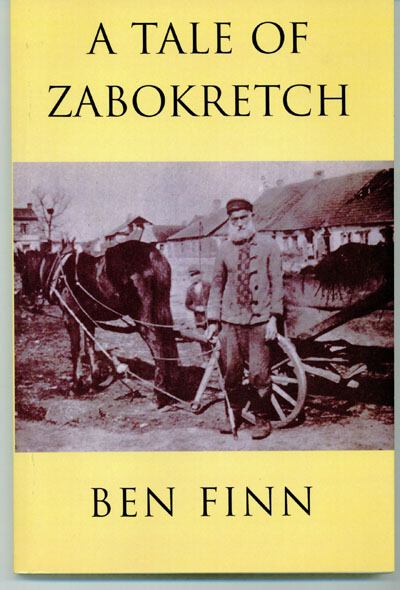|
By Donald H. Harrison
 SAN DIEGO—Although the copyright on this book is already seven years old, Finn—who writes musical productions—is now marketing this self-published tale by alerting news media of its availability for review. I am glad that I took him up on it, because his writing is clear, concise and memorable. SAN DIEGO—Although the copyright on this book is already seven years old, Finn—who writes musical productions—is now marketing this self-published tale by alerting news media of its availability for review. I am glad that I took him up on it, because his writing is clear, concise and memorable.
The story concerns the events in the Ukrainian village of Zabokretch in 1919, during the early days of the Russian revolution, when Ukrainian nationalists still were resisting the Soviet Red Army. In the mythology of the right-wing Ukrainians, “communism “was simply another word for “Jewish power.” In their bigoted view, to kill Jews—any Jews—was to stand up for the Ukraine.
In Zabokretch, a small town with a mixed population of Jews and Gentiles, that meant for the Ukrainians the “enemy” were the tailors, bakers, butchers and other tradesmen with whom they did business every day. Not only the Jewish merchants, but their wives and children—right down to their infants—were also “enemies” of the Ukrainian people. Even the village beggar was not exempt.
Finn sketches daily life in the shtetl, foreshadowing the pogrom to come by having a grandfather relate to a young girl what happened to him back in 1881 when it was his misfortune to visit Kiev during one of the worst outbreaks up to that point of violence, rape and murder ever visited upon the Jews.
Could such a thing ever happen in little Zabokretch? And if it did, would any of their Christian neighbors come to the aid of the Jews—or would they join in the bloodletting?
Readers don’t have to wait very long for the answer. The book is a well-written nightmare, moving from a scene of carnage here juxtaposed with a touching instance of humanitarianism there. When the Ukrainian “army” comes to Zabokretch, there was no shortage of townspeople ready to join in the murder and the looting, but here and there individuals of conscience—at risk to their own lives—protected the Jews by helping them to hide.
We know similar stories from the Holocaust, of course; if this tale adds at all to our knowledge of the terrible things that
Go to the top of right column
|
 people can do to each other, it is that such unreasoning, dehumanizing, hate-filled anti-Semitism was not originated by the Nazis. people can do to each other, it is that such unreasoning, dehumanizing, hate-filled anti-Semitism was not originated by the Nazis.
While reading the short book, I couldn''t help but puzzle over what audience Finn had in mind. His story, told by an omniscient narrator, stops here and there to explain some customs well-known to Jews, so evidently he pictured Christians and other non-Jews also reading this story. The simplicity with which he wrote it made me suspect he had a juvenile readership in mind—or at least one with little sophistication. But, the question nagged me, what parent would want to expose children to such horrors?
The book may be obtained via the xlibris website.
|
|

